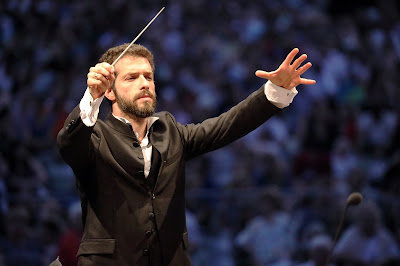 |
| Omer Wellber (photo:Wilfred Hoesl.Courtesy Raanana Symphonette) |
The domains of music and dance meet and intermingle naturally, with the initiative for connecting the two arts usually coming from dance companies. However, such a meeting of the two in "Proximity or Closeness" is the initiative of Maestro Omer Meir Wellber and the Raanana Symphonette Orchestra, of which Wellber has been music director since 2009. This project, featuring Mahler's "Quartettsatz" and Alfred Schnittke's Allegro (from “Piano Quartet in a minor after Mahler) will be presented to the public in two concerts (February 7th, 8th, 2023, at the Raanana Centre of Performing Arts). The piano quartet will consist of three members of the Zori family - Carmit Zori (violin), Nitai Zori (violin) and Hillel Zori ('cello) - with Omer Meir Wellber at the piano. Two dancers - Giorgia Leonardi and Emilio Barone will perform to the works, as choreographed by Ermanno Sbezzo; all three dance artists hail from Italy. The concert will conclude with Beethoven's Symphony No.5 in C minor.
On January 16th, I had the pleasure of talking to Wellber in Milan, Italy.
PH: Maestro Wellber, I have noticed that, throughout your career, your music-making has had connections with other art forms.
OMW: Yes. I am presently doing a lot in conjunction with dance. My relationship with dance started when, as a young adult, I worked as a pianist for ballet lessons. Today, I make a point of involving dance in my productions in Palermo and Vienna. For some reason, dance is considered a "secondary" art (with conductors often being paid less to conduct for dance productions than for concerts of music.) I see great importance in bringing the status of dance to the level of concert music.
PH: And your collaboration with choreographer Ermanno Sbezzo?
OMW: This is a new connection. We wanted someone young and to bring the younger generation of artists to Israel, especially as Israel has an interesting dance scene. I met with Ermanno Sbezzo before the summer. We talked, I introduced the music to him and then left it with him. I want him to do what he chooses to do with it. He is very young. I like to see what these young artists can do.
PH: The music you have chosen is certainly very different from more familiar concert fare.
OMW: Yes. Audiences will be in for a big surprise. They are used to hearing Gustav Mahler's symphonic works for very large orchestras and some might have heard his songs. However, together with the dancers, we will be performing the Quartettsatz (the first and only complete movement of his Piano Quartet in A minor) followed by Alfred Schnittke's original reworking (and not completion) of Mahler's sketches of the quartet's second movement. Schnittke starts off with fragments of one of the main themes from the quartet, proceeds with music of his own taste and style, then finally bringing back the mood of Mahler’s quartet before ending the movement. I am a great admirer of Schnittke. For me this production is a dream. It is a discussion between time and between two sick men who find themselves on the same canvas.
PH: Why did you decide on Beethoven's Symphony No.5 to end the concert?
OMW: It is also built on one motif. And Beethoven is another giant.
PH: This is a very unique program!
OMW: Yes and no. One hallmark of the Raanana Symphonette's repertoire is that it is enterprising and different; so, you might say that "Proximity or Closeness" is yet another unique program of the orchestra's repertoire and the direction in which it is going.
PH: But don't you find the conservative taste of Israeli concert audiences limiting for such different programs?
OMW: No. I think the problem lies with those in charge of programming concerts.
PH: So, what is the secret to attracting audiences to different programs such as this?
OMW: Trust. Once you gain the public's trust, you can do it. That is the main issue. It's like telling the truth.
PH: Maestro Wellber, many thanks for your time.
Born in 1981 in Beer Sheva, Israel, Omer Meir Wellber began his musical training at age five, playing the accordion and piano, taking up composing by the age of nine. He studied conducting and composition at the Jerusalem Academy of Music. He was assistant to Daniel Barenboim for two years. Today, in addition to his role as director of the Raanana Symphonette, Omer Meir Wellber serves as music director of the Volksoper Wien, music director of the Teatro Massimo Palermo and artistic director of the Toscanini Festival.

I enjoyed this interview. It would be nice if you could in the future interview Mikko Franck and Dmitri Slobodeniouk. I consider both of these conductors superlative musicians. Thanks for your wonderful work.
ReplyDelete